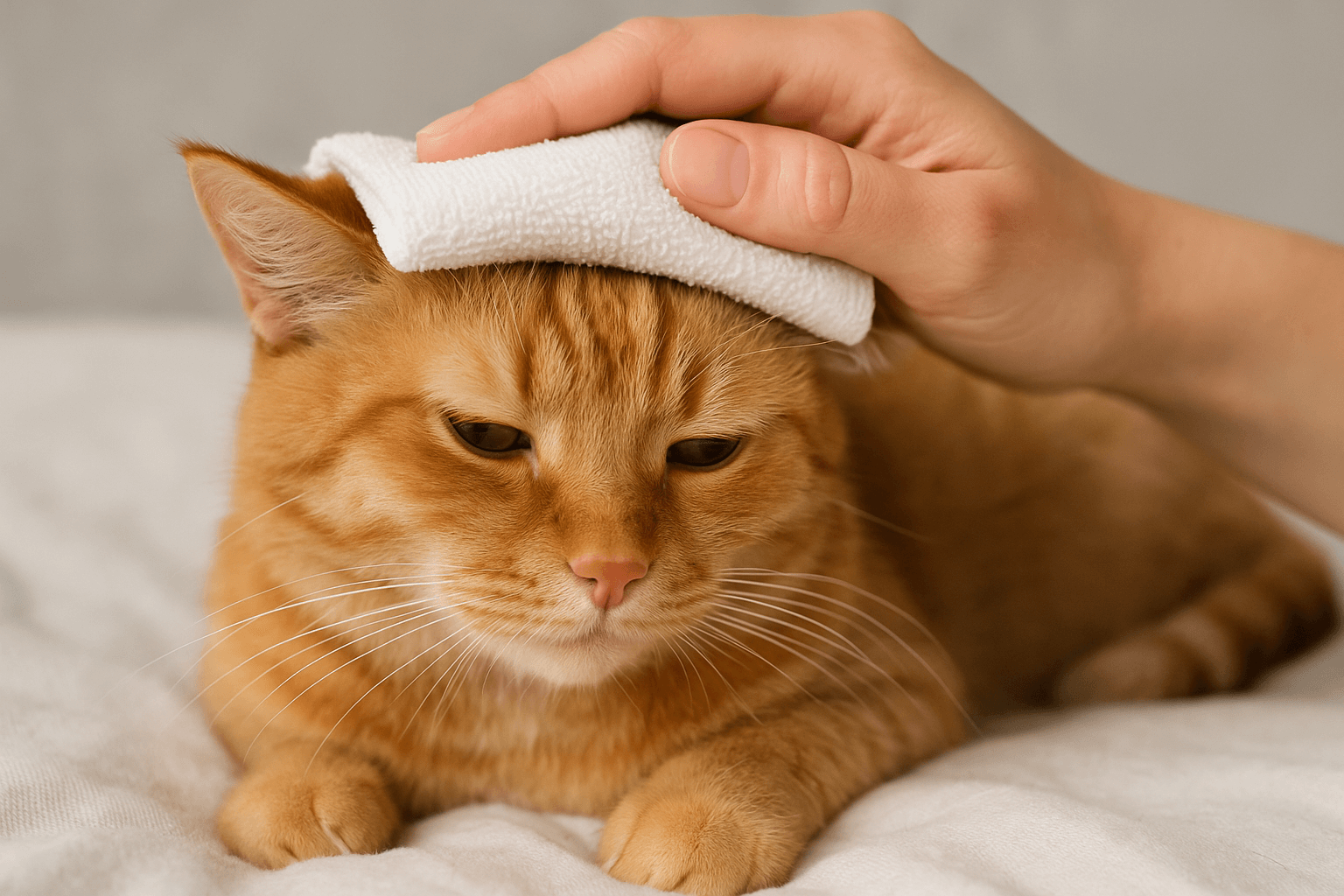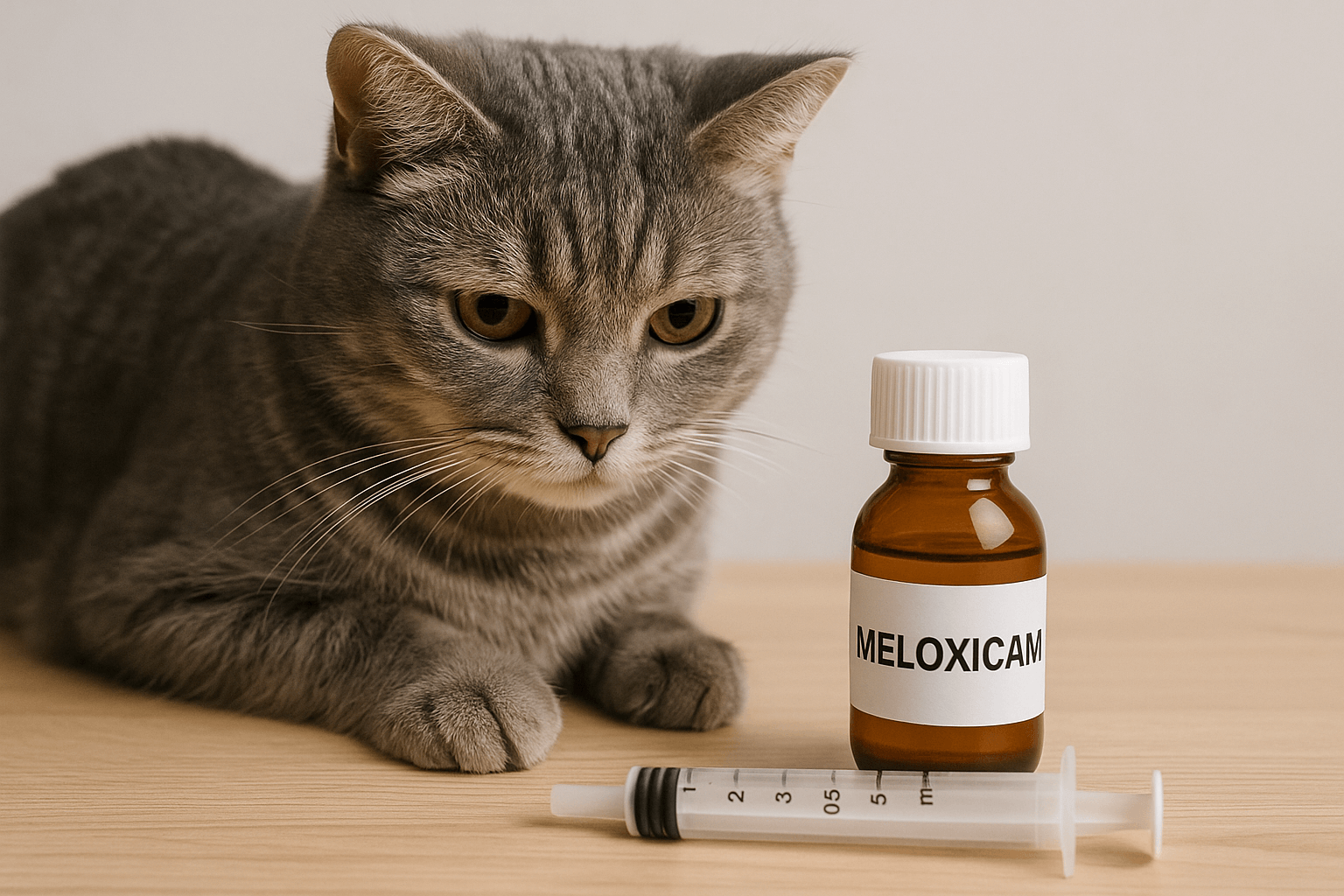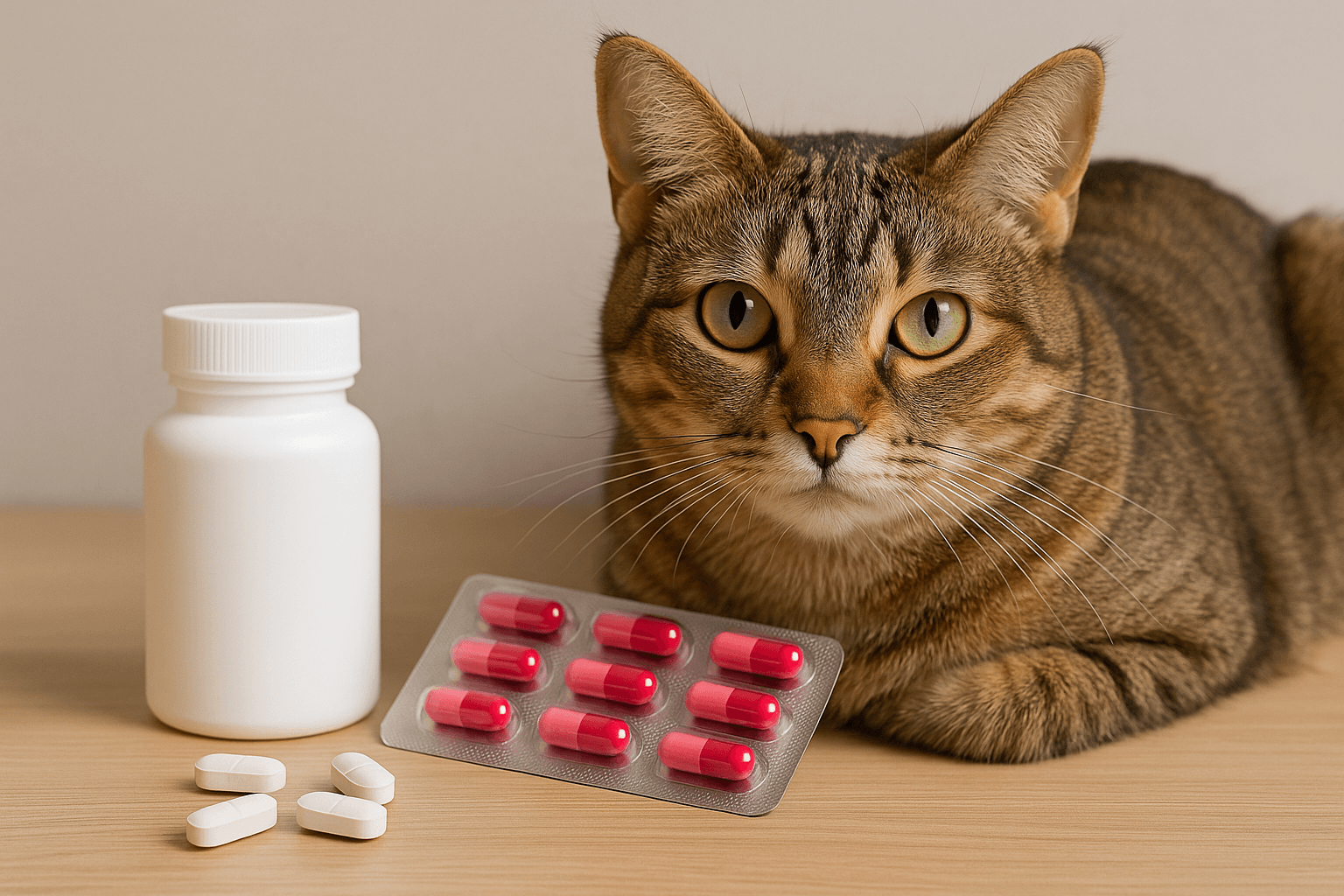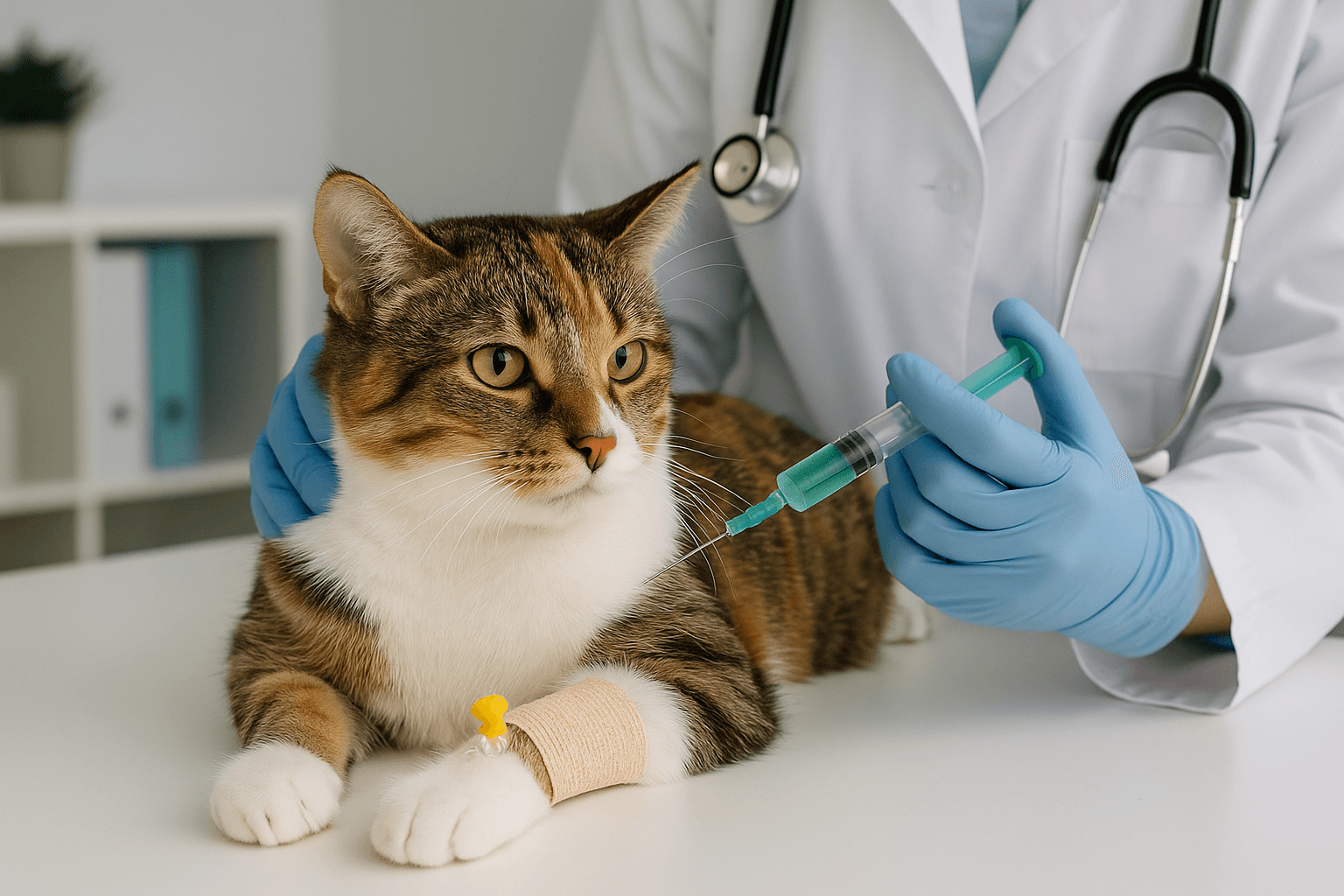Cat Overweight but Not Overeating? Understanding the Mystery
If your cat seems to be gaining weight despite not overeating, you’re not alone. Many cat owners face this puzzling situation, wondering how their feline friend can pack on pounds without consuming excessive food. While diet plays a significant role in weight management, other factors like metabolism, activity levels, and underlying health conditions can contribute to unexpected weight gain. In this blog post, we’ll explore the reasons behind this phenomenon, offer practical solutions, and provide expert tips to help your cat achieve and maintain a healthy weight. Let’s dive into the mystery of why your cat might be overweight but not overeating.
Potential Causes of Weight Gain in Cats
Understanding why your cat is gaining weight requires looking beyond their food bowl. Several factors could be at play, even if they aren’t eating excessively.
Slowing Metabolism:
As cats age, their metabolism naturally slows down, leading to weight gain even if their calorie intake remains the same.Lack of Physical Activity:
Indoor cats, especially those who don’t engage in regular play or exercise, burn fewer calories, which can result in weight gain over time.Underlying Health Conditions:
Conditions like hypothyroidism, insulin resistance, or Cushing’s disease can disrupt your cat’s hormonal balance and lead to unexplained weight gain.Low-Quality Food:
Even if your cat isn’t eating large quantities, nutrient-poor or high-carbohydrate food can contribute to weight gain due to its low nutritional value.Genetic Predisposition:
Some breeds are more prone to weight gain than others, regardless of their eating habits or activity levels.
Identifying the root cause of your cat’s weight gain is the first step toward addressing the issue effectively.
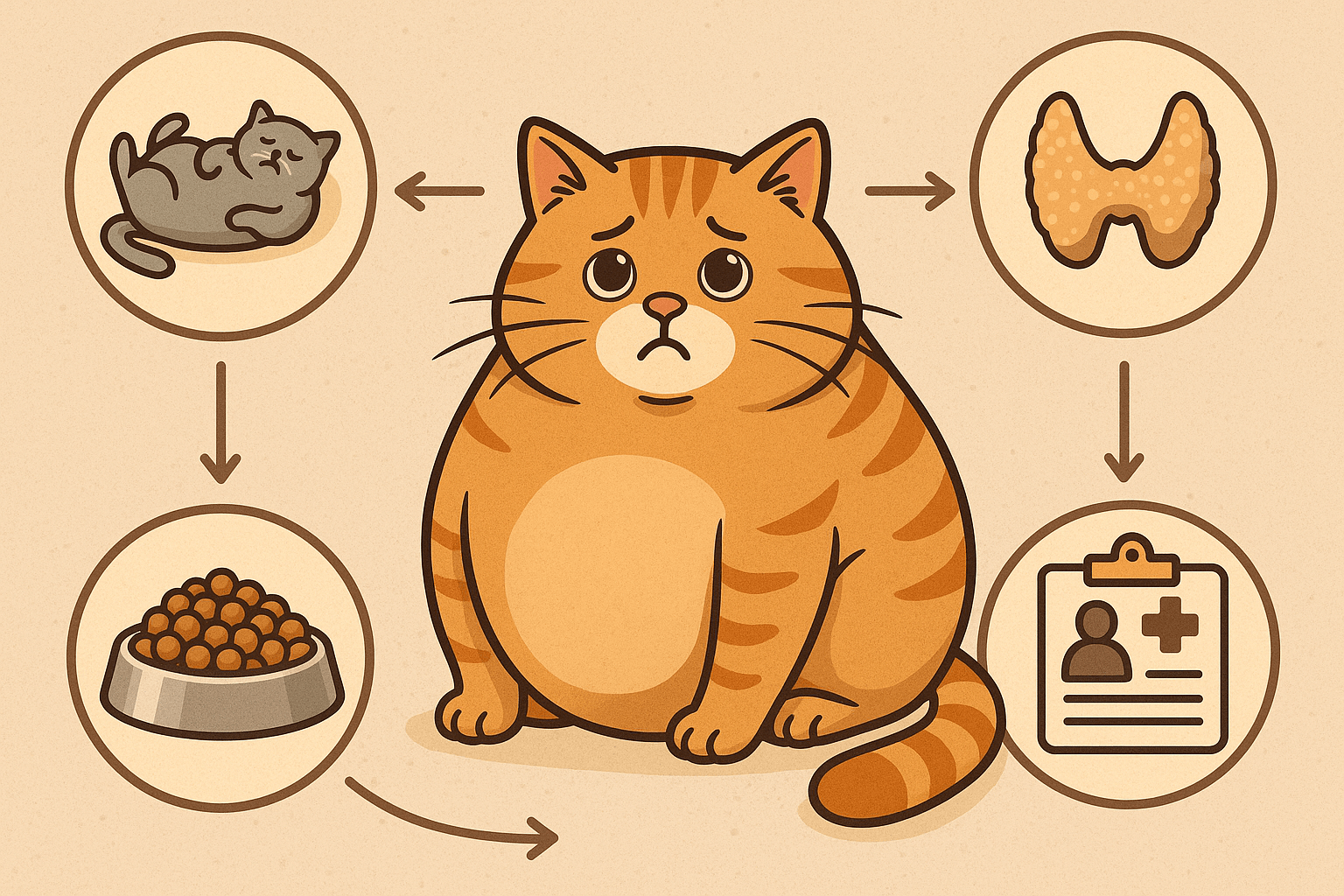
Signs Your Cat May Be Overweight
Recognizing whether your cat is overweight is crucial for taking timely action. Look out for these physical and behavioral signs that indicate your cat may need a healthier lifestyle.
Difficulty Feeling Ribs:
You should be able to feel your cat’s ribs with gentle pressure. If they’re covered by a thick layer of fat, your cat may be overweight.Lethargy or Reduced Playfulness:
Overweight cats often show less interest in playing or moving around, as excess weight makes physical activity more challenging.Visible Fat Pads:
Check for fat deposits near the base of the tail, abdomen, or sides. These are telltale signs of excess weight.Shortness of Breath:
Overweight cats may pant or breathe heavily after minimal exertion, such as walking or jumping.Changes in Grooming Habits:
Excess weight can make it harder for cats to groom themselves properly, leading to matted fur or poor hygiene.
By staying vigilant about these signs, you can intervene early and prevent further health complications for your cat.
Check this guide 👉Overweight Cat Causes: Best 7 Expert Tips!
Check this guide 👉Do Cats Gain Weight After Being Spayed? Best 7 Expert Tips!
Check this guide 👉How to Know If Your Cat Is Overweight: Best 7 Expert Tips!
Factors Contributing to Weight Gain | Ways to Address Them |
|---|---|
Slowing metabolism | Provide portion-controlled, high-protein meals |
Lack of physical activity | Engage in daily interactive play sessions |
Underlying health conditions | Schedule regular vet check-ups |
Low-quality food | Switch to premium, species-appropriate food |
Genetic predisposition | Monitor weight closely and adjust care routines |
How to Help Your Overweight Cat Lose Weight Safely
Helping your cat shed excess weight requires a balanced approach that prioritizes their health and happiness. Follow these steps to create a safe and effective weight loss plan.
Consult Your Veterinarian:
Before making any changes, consult your vet to rule out underlying health issues and get personalized advice.Switch to High-Protein, Low-Carb Food:
Cats thrive on protein-rich diets that mimic their natural prey-based nutrition, helping them feel fuller while consuming fewer calories.Measure Portion Sizes Carefully:
Avoid free-feeding and measure your cat’s meals to ensure they’re getting the right amount of food for their ideal weight.Encourage Regular Exercise:
Use toys, laser pointers, or interactive feeders to stimulate your cat’s hunting instincts and encourage movement.Monitor Progress Regularly:
Track your cat’s weight weekly and adjust their diet or exercise routine as needed to ensure steady, healthy progress.
With patience and consistency, these strategies can help your cat achieve a healthier weight over time.
Tips for Creating an Active Lifestyle for Your Cat
Even indoor cats can stay active and engaged with the right environment and encouragement. Here are some tips to promote a more active lifestyle for your feline companion.
Set Up Vertical Spaces:
Install cat trees or shelves to encourage climbing and jumping, which burns calories and keeps muscles strong.Rotate Toys Regularly:
Keep your cat entertained by rotating toys every few days to maintain their interest and curiosity.Use Puzzle Feeders:
Puzzle feeders challenge your cat mentally and physically, turning mealtime into an engaging activity.Schedule Playtime Daily:
Dedicate at least 15-20 minutes each day to interactive play, using wand toys or balls to get your cat moving.Create a Safe Outdoor Space:
If possible, build a secure catio or enclosed outdoor area where your cat can explore safely.
An active lifestyle not only helps with weight management but also improves your cat’s overall well-being and happiness.
Hidden Risks of Obesity in Cats
Obesity in cats doesn’t just affect their appearance—it can lead to serious health issues that impact their quality of life. Here’s what you need to know about the risks associated with excess weight.
Increased Risk of Diabetes:
Overweight cats are more likely to develop type 2 diabetes, which requires lifelong management.Joint Problems and Arthritis:
Excess weight puts strain on joints, increasing the likelihood of arthritis and mobility issues.Heart and Respiratory Issues:
Obesity can strain the cardiovascular system and lead to breathing difficulties.Shortened Lifespan:
Studies show that overweight cats tend to live shorter lives compared to their healthy-weight counterparts.Compromised Immune System:
Excess fat can weaken the immune system, making cats more susceptible to infections and illnesses.
Understanding these risks underscores the importance of maintaining a healthy weight for your cat.
How Stress Affects Cat Weight
Stress is often overlooked as a factor in feline weight gain, but it can play a significant role in disrupting your cat’s health. Here’s how stress impacts weight and what you can do about it.
Emotional Eating Behavior:
Some cats turn to food for comfort when stressed, similar to humans, leading to overconsumption.Hormonal Imbalances:
Chronic stress releases cortisol, a hormone that can contribute to fat storage and weight gain.Reduced Activity Levels:
Stressed cats may become less active, preferring to hide or sleep rather than engage in play.Digestive Issues:
Stress can upset your cat’s digestive system, affecting nutrient absorption and metabolism.Environmental Triggers:
Changes in routine, loud noises, or unfamiliar visitors can all cause stress-related weight fluctuations.
Minimizing stress through environmental enrichment and routine can help mitigate its effects on your cat’s weight.
Foods That Support Weight Loss in Cats
Choosing the right food is essential for helping your cat lose weight safely. These options provide nutrition while promoting weight management.
High-Protein Wet Food:
Wet food is lower in carbs and higher in moisture, keeping your cat hydrated and satisfied.Grain-Free Options:
Grain-free foods reduce unnecessary carbohydrates, which can contribute to weight gain.Limited Ingredient Diets:
These diets minimize fillers and focus on high-quality proteins, aiding digestion and metabolism.Portion-Controlled Treats:
Opt for low-calorie treats made from natural ingredients to reward your cat without adding extra calories.Homemade Meals (with Vet Approval):
Preparing meals at home allows you to control ingredients, but always consult your vet to ensure nutritional balance.
Feeding your cat the right foods can support their journey to a healthier weight while satisfying their taste buds.
Frequently Asked Questions About Cat Weight Management
Can cats lose weight without changing their diet?
Yes, increasing physical activity can help, but combining exercise with dietary adjustments yields the best results.
How much weight should my cat lose per month?
Aim for gradual weight loss of 1-2% of their body weight per month to avoid health risks.
What if my cat refuses to eat new food?
Transition slowly by mixing old and new food gradually, and consult your vet for recommendations.
Are all overweight cats unhealthy?
While some overweight cats may remain asymptomatic, excess weight increases the risk of diabetes, arthritis, and other conditions.
Can stress cause weight gain in cats?
Yes, chronic stress can disrupt hormones and appetite regulation, potentially leading to weight gain.
A Healthy Cat Is a Happy Cat
Addressing weight gain in cats requires patience, observation, and a holistic approach that considers their unique needs. By understanding the causes, recognizing the signs, and implementing safe weight management strategies, you can help your cat live a longer, healthier life. Remember, small changes—like providing better food, encouraging play, or consulting your vet—can make a big difference. With love, care, and commitment, you can ensure your feline friend stays fit and happy for years to come.
Cat Fever Treatment: Best 7 Expert Tips! Discover expert advice on identifying, managing, and treating fever in cats to ensure their quick recovery and well-being.
Understanding Meloxicam for Cats: Best 7 Expert Tips! Learn how to safely administer meloxicam, manage side effects, and ensure your cat's comfort with expert advice on feline pain relief.
Amoxicillin for Cat UTI: Best 7 Expert Tips! Discover safe usage, dosage guidelines, and expert advice on treating feline urinary tract infections effectively with amoxicillin.
Understanding Cat Cancer Treatment: Best 7 Expert Tips! Discover expert advice on managing feline cancer, from early detection to treatment options, ensuring your cat’s health and comfort.

